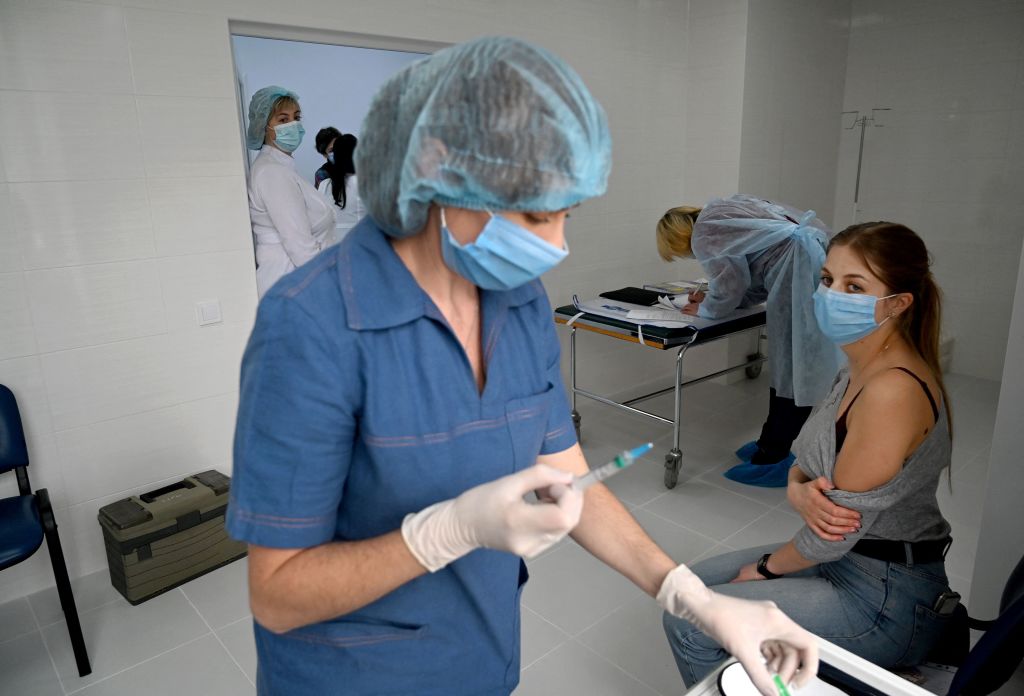Many COVID long-haulers report improved symptoms after getting the vaccine. A new study backs them up.


A free daily email with the biggest news stories of the day – and the best features from TheWeek.com
You are now subscribed
Your newsletter sign-up was successful
A significant number of the 30 million Americans infected with COVID-19 have lingering symptoms months after their initial illness. And many of these people with "long COVID," or COVID long-haulers, are reporting that their symptoms improved or cleared up after getting vaccinated. "That's not how vaccines work, normally," Tom Avril writes in The Philadelphia Inquirer. "The idea is to prevent disease, not treat it."
There were concerns that getting vaccinated would actually exacerbate long-haulers' symptoms, including fatigue, brain fog, shortness of breath, headaches, insomnia, and inability to smell. But "it's clear that vaccines have helped some people with long COVID with their symptoms," Yale immunologist Akiko Iwasaki wrote in a recent Medium post, laying out three possible explanations for how vaccines attack long COVID. The evidence for these improvements has been largely anecdotal or based on informal polls among long-hauler support groups.
But a new study by University of Bristol researchers, not yet published or peer-reviewed, found a statistically significant improvement among long COVID patients who got either the Pfizer or Oxford-AstraZeneca vaccine.
The Week
Escape your echo chamber. Get the facts behind the news, plus analysis from multiple perspectives.

Sign up for The Week's Free Newsletters
From our morning news briefing to a weekly Good News Newsletter, get the best of The Week delivered directly to your inbox.
From our morning news briefing to a weekly Good News Newsletter, get the best of The Week delivered directly to your inbox.
COVID long-haulers who got the vaccine experienced "no significant worsening in quality-of-life or mental wellbeing," the researchers wrote, and "when compared to matched unvaccinated participants from the same cohort, those who had receive a vaccine had a small overall improvement in long COVID symptoms."
It's possible the improvements for vaccinated long COVID patients could be due to the placebo effect, or the immune response sparked by the vaccine could wipe out lingering reservoirs of coronavirus, clean the body of "ghost" viral fragments, or distract the body from a harmful autoimmune response — all theories floated by Iwasaki and other immunologists and virologists.
Either way, immunologist Dr. Nancy Klimas tells ABC News, "my advice to long-haulers is to get the vaccine, not because of this, but because they should anyway, and if they get this as a bonus, I want to know."
A free daily email with the biggest news stories of the day – and the best features from TheWeek.com
Peter has worked as a news and culture writer and editor at The Week since the site's launch in 2008. He covers politics, world affairs, religion and cultural currents. His journalism career began as a copy editor at a financial newswire and has included editorial positions at The New York Times Magazine, Facts on File, and Oregon State University.
-
 The Week Unwrapped: Do the Freemasons have too much sway in the police force?
The Week Unwrapped: Do the Freemasons have too much sway in the police force?Podcast Plus, what does the growing popularity of prediction markets mean for the future? And why are UK film and TV workers struggling?
-
 Properties of the week: pretty thatched cottages
Properties of the week: pretty thatched cottagesThe Week Recommends Featuring homes in West Sussex, Dorset and Suffolk
-
 The week’s best photos
The week’s best photosIn Pictures An explosive meal, a carnival of joy, and more
-
 Trump HHS slashes advised child vaccinations
Trump HHS slashes advised child vaccinationsSpeed Read In a widely condemned move, the CDC will now recommend that children get vaccinated against 11 communicable diseases, not 17
-
 FDA OKs generic abortion pill, riling the right
FDA OKs generic abortion pill, riling the rightSpeed Read The drug in question is a generic version of mifepristone, used to carry out two-thirds of US abortions
-
 RFK Jr. vaccine panel advises restricting MMRV shot
RFK Jr. vaccine panel advises restricting MMRV shotSpeed Read The committee voted to restrict access to a childhood vaccine against chickenpox
-
 Texas declares end to measles outbreak
Texas declares end to measles outbreakSpeed Read The vaccine-preventable disease is still spreading in neighboring states, Mexico and Canada
-
 RFK Jr. shuts down mRNA vaccine funding at agency
RFK Jr. shuts down mRNA vaccine funding at agencySpeed Read The decision canceled or modified 22 projects, primarily for work on vaccines and therapeutics for respiratory viruses
-
 Measles cases surge to 33-year high
Measles cases surge to 33-year highSpeed Read The infection was declared eliminated from the US in 2000 but has seen a resurgence amid vaccine hesitancy
-
 Kennedy's vaccine panel signals skepticism, change
Kennedy's vaccine panel signals skepticism, changeSpeed Read RFK Jr.'s new vaccine advisory board intends to make changes to the decades-old US immunization system
-
 Kennedy ousts entire CDC vaccine advisory panel
Kennedy ousts entire CDC vaccine advisory panelspeed read Health Secretary RFK Jr. is a longtime anti-vaccine activist who has criticized the panel of experts
